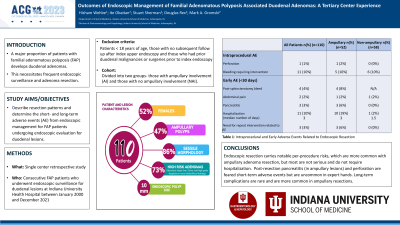Monday Poster Session
Category: Small Intestine
P2631 - Outcomes of Endoscopic Management of Familial Adenomatous Polyposis Associated Duodenal Adenomas: A Tertiary Center Experience
Monday, October 23, 2023
10:30 AM - 4:15 PM PT
Location: Exhibit Hall

Has Audio

Hisham Wehbe, MD
Indiana University School of Medicine
Indianapolis, IN
Presenting Author(s)
Hisham Wehbe, MD, Itegbemie Obaitan, MD, MPH, Stuart Sherman, MD, Douglas K. Rex, MD, Mark A. Gromski, MD
Indiana University School of Medicine, Indianapolis, IN
Introduction: Familial adenomatous polyposis (FAP) is associated with a high prevalence of duodenal adenomas necessitating frequent endoscopic surveillance and resection. Our study aims to describe resection patterns and to determine the short- and long-term adverse events from endoscopic management.
Methods: We performed a retrospective review for consecutive FAP patients who underwent endoscopic resection of duodenal lesions at Indiana University hospital between January 2000 and December 2021. We excluded patients < 18 years of age and those who had prior duodenal malignancies or duodenal resections prior to index endoscopy. The cohort was divided into two groups - those with ampullary involvement (AI) and those with no ampullary involvement (NAI).
Results: One hundred and ten patients with FAP were included. Patient, lesion, and resection characteristics are found in Table 1. 47% had ampullary involvement at their index endoscopy and 73% of patients had high-risk adenomas (HRA) defined as adenomas larger than 10mm, had high grade dysplasia or were tubulovillous histology. Median lesion size was 10mm. The AI group had a higher incidence of intraprocedural adverse events (12% vs 10% in the NAI group), with intraprocedural bleeding requiring intervention being the most common complication. Perforations occurred in 1% of all patients (2% in AI vs 0% in NAI group). There was a higher rate of early adverse events requiring readmission within 30 days after the endoscopy in the AI group (35% vs 4% in the NAI group). Post-ERCP pancreatitis occurred in 3% of all patients (6% in AI vs 0% in NAI group). 10% of those with intraprocedural and early adverse events required hospitalization with a median hospital stay of 3 days and 3% required additional endoscopic procedures for complication management. Only three patients from the AI group developed complications beyond 30 days of the initial endoscopy including orifice stenosis and biliary strictures. No post-procedure deaths were reported.
Discussion: This study is one of the largest cohorts of FAP patients undergoing endoscopic resection for duodenal lesions to date. Endoscopic resection carries notable per-procedure risks, which are more common with ampullary adenoma resection, but most are not serious and do not require hospitalization. Post-resection pancreatitis (in ampullary lesions) and perforation are feared short-term adverse events but are uncommon in expert hands. Long-term complications are rare and are more common in ampullary resections.
Disclosures:
Hisham Wehbe, MD, Itegbemie Obaitan, MD, MPH, Stuart Sherman, MD, Douglas K. Rex, MD, Mark A. Gromski, MD. P2631 - Outcomes of Endoscopic Management of Familial Adenomatous Polyposis Associated Duodenal Adenomas: A Tertiary Center Experience, ACG 2023 Annual Scientific Meeting Abstracts. Vancouver, BC, Canada: American College of Gastroenterology.
Indiana University School of Medicine, Indianapolis, IN
Introduction: Familial adenomatous polyposis (FAP) is associated with a high prevalence of duodenal adenomas necessitating frequent endoscopic surveillance and resection. Our study aims to describe resection patterns and to determine the short- and long-term adverse events from endoscopic management.
Methods: We performed a retrospective review for consecutive FAP patients who underwent endoscopic resection of duodenal lesions at Indiana University hospital between January 2000 and December 2021. We excluded patients < 18 years of age and those who had prior duodenal malignancies or duodenal resections prior to index endoscopy. The cohort was divided into two groups - those with ampullary involvement (AI) and those with no ampullary involvement (NAI).
Results: One hundred and ten patients with FAP were included. Patient, lesion, and resection characteristics are found in Table 1. 47% had ampullary involvement at their index endoscopy and 73% of patients had high-risk adenomas (HRA) defined as adenomas larger than 10mm, had high grade dysplasia or were tubulovillous histology. Median lesion size was 10mm. The AI group had a higher incidence of intraprocedural adverse events (12% vs 10% in the NAI group), with intraprocedural bleeding requiring intervention being the most common complication. Perforations occurred in 1% of all patients (2% in AI vs 0% in NAI group). There was a higher rate of early adverse events requiring readmission within 30 days after the endoscopy in the AI group (35% vs 4% in the NAI group). Post-ERCP pancreatitis occurred in 3% of all patients (6% in AI vs 0% in NAI group). 10% of those with intraprocedural and early adverse events required hospitalization with a median hospital stay of 3 days and 3% required additional endoscopic procedures for complication management. Only three patients from the AI group developed complications beyond 30 days of the initial endoscopy including orifice stenosis and biliary strictures. No post-procedure deaths were reported.
Discussion: This study is one of the largest cohorts of FAP patients undergoing endoscopic resection for duodenal lesions to date. Endoscopic resection carries notable per-procedure risks, which are more common with ampullary adenoma resection, but most are not serious and do not require hospitalization. Post-resection pancreatitis (in ampullary lesions) and perforation are feared short-term adverse events but are uncommon in expert hands. Long-term complications are rare and are more common in ampullary resections.
Disclosures:
Hisham Wehbe indicated no relevant financial relationships.
Itegbemie Obaitan indicated no relevant financial relationships.
Stuart Sherman: Boston Scientific – Consultant. Cook – Consultant. Olympus – Consultant.
Douglas Rex: Acacia – Consultant. Boston Scientific – Consultant, Speakers Bureau. Braintree – Consultant, Grant/Research Support. ERBE – Grant/Research Support. Medtronic – Consultant, Speakers Bureau. Norgine – Consultant. Olympus Corporation – Consultant, Grant/Research Support. Satisfai Health – Owner/Ownership Interest.
Mark Gromski: Ambu – Consultant. Boston Scientific – Consultant. Cook Medical – Grant/Research Support.
Hisham Wehbe, MD, Itegbemie Obaitan, MD, MPH, Stuart Sherman, MD, Douglas K. Rex, MD, Mark A. Gromski, MD. P2631 - Outcomes of Endoscopic Management of Familial Adenomatous Polyposis Associated Duodenal Adenomas: A Tertiary Center Experience, ACG 2023 Annual Scientific Meeting Abstracts. Vancouver, BC, Canada: American College of Gastroenterology.
